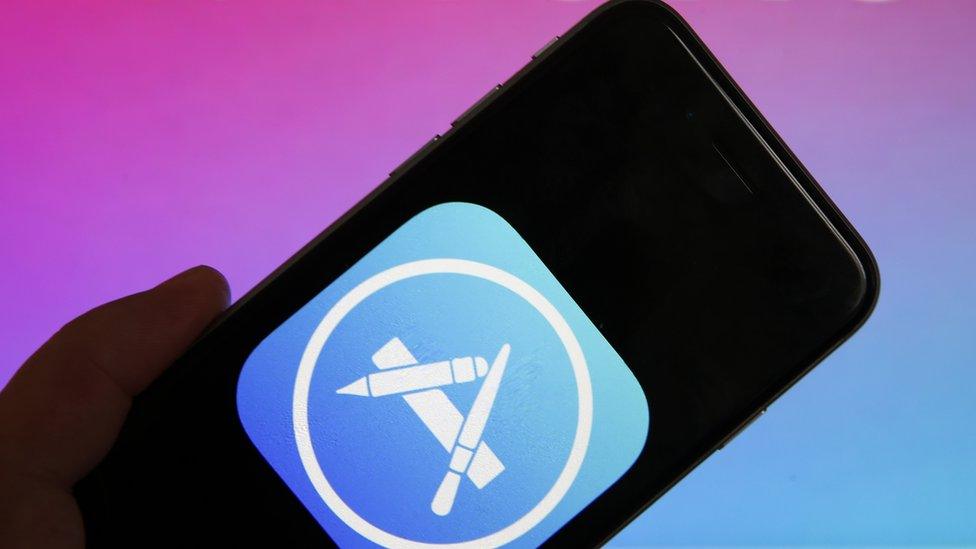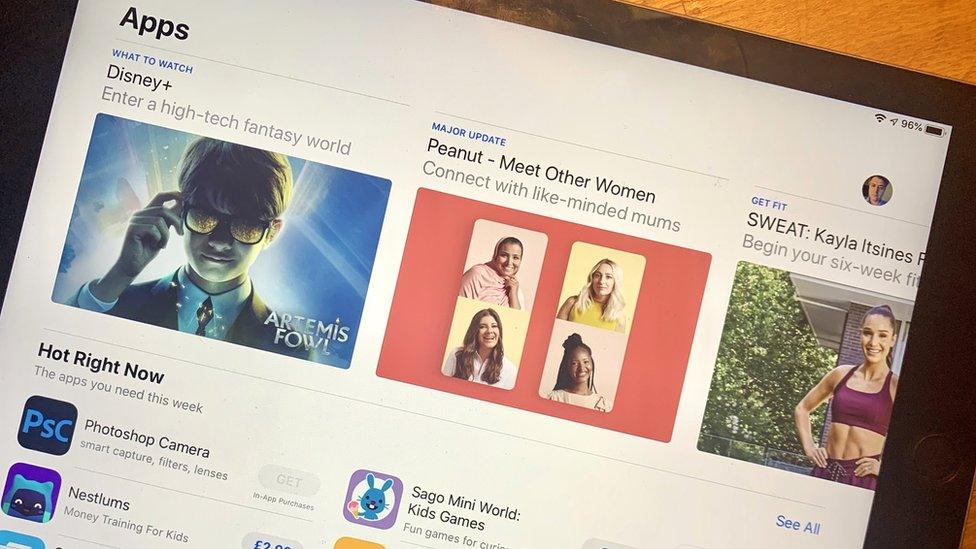Apple App Store faces coalition of unhappy developers
- Published

Several major developers have formed a coalition to fight Apple over its app store policies.
The Coalition for App Fairness counts Spotify, Epic Games and Tinder owner Match Group among its founding members.
It claims Apple "taxes consumers and crushes innovation", criticising what it calls anti-competitive policies.
Apple, which is embroiled in legal action with some of the members, has long denied these accusations.
Google, which runs the Play app store on Android, is not mentioned in the group's launch statement but is named elsewhere on its website, and accused of similar policies.
The coalition has been established as an independent non-profit organisation, and is open to other developers - regardless of size - to join.
Alongside an 11-point "vision", external, the group has identified three key issues it will campaign on:
alleged anti-competitive policies from both Apple and Google, which it says limits products and features available to consumers
the 30% cut that both Apple and Google take from sales through their app stores, which the group says is an "app tax"
what it alleges is a lack of consumer freedom, with "no competition, no options, no recourse"
Some of the founding members are longstanding public critics of Apple's policies in particular.
Epic Games has in recent months been involved in a very public spat with Apple - and to a lesser extent, Google - after it deliberately breached their guidelines and began a legal battle over them.
Allow X content?
This article contains content provided by X. We ask for your permission before anything is loaded, as they may be using cookies and other technologies. You may want to read X’s cookie policy, external and privacy policy, external before accepting. To view this content choose ‘accept and continue’.
Spotify, meanwhile, has filed a complaint with the European Union against Apple's policies, while Tile has previously accused Apple of anti-competitive behaviour, making antitrust claims in the US and Europe.
Basecamp, another member, is behind Hey - an email app which found itself at the centre of an enormous public dispute over the App Store earlier this year.
And Prepear, a listed member, is a relatively small firm which recently found itself defending its logo from a trademark dispute after Apple said the pear shape was too similar to its own logo.
'Basic freedoms'
In a statement about the coalition, Epic Games boss Tim Sweeney said: "The basic freedoms of developers are under attack.
"We are an advocate for any company that's ready to reclaim its rights and challenge the anti-competitive behaviours that exist on app stores today."
Jaden "Wolfiez" Ashman became the youngest esports player to win a million dollars
Match Group, which owns Tinder and other dating apps, said it was joining because Apple's in-app purchase system "forces consumers to pay higher prices by inserting Apple between app developers and their users, leading to customer confusion and dissatisfaction that has far-reaching implications for our businesses".
Other founding members include Blix, Blockchain.com, Deezer, the European Publishers Council, News Media Europe, Protonmail and SkyDemon.
Apple has yet to comment directly on the formation of the new group.
But it maintains that its 30% cut of App Store sales is in line with industry standards and other digital marketplaces.
It has also recently released new statistics on its investment in user security and privacy last year, including:
rejecting more than 150,000 app submissions for violating privacy guidelines
reviewing more than 100,000 apps every week
rejecting more than a million apps for harmful, objectionable, or illegal content
removing more than 60 million spam reviews
Such investments are one of the arguments Apple puts forward for retaining control of its ecosystem, arguing that it leads to increased security and safety for users.
- Published8 September 2020

- Published28 August 2020

- Published14 August 2020

- Published13 August 2020

- Published11 August 2020

- Published15 June 2020
